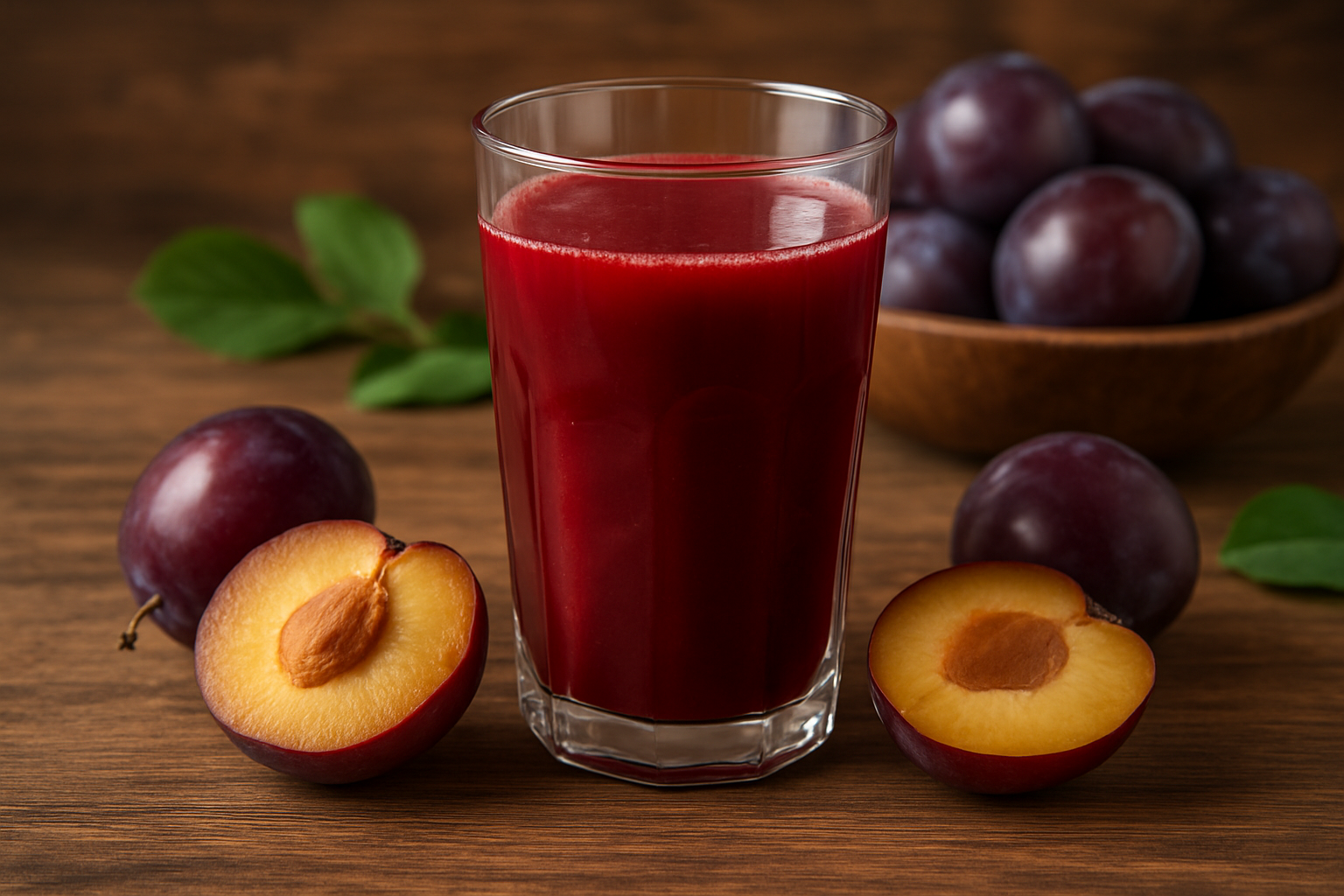Plum juice is more than just a refreshing drink. Made from ripe, juicy plums, it carries a naturally sweet and slightly tangy flavor that people around the world enjoy. Beyond taste, plum juice is also valued for its nutritional benefits, offering a source of vitamins, minerals, and antioxidants that support overall health. In this guide, we will explore what plum juice is, its nutritional profile, the health advantages it offers, and how you can enjoy it in different ways. Whether you are curious about making it at home, comparing it to store-bought options, or understanding potential side effects, this article will give you a complete, easy-to-follow overview.
What Is Plum Juice?
Plum juice is a beverage made by pressing or blending plums, a fruit known for its vibrant color and natural sweetness. Plums have been cultivated for thousands of years, and they are enjoyed both fresh and dried. When turned into juice, plums release their rich flavor and nutrients, resulting in a drink that is both refreshing and nourishing. Traditionally, plum juice has been prepared in many cultures not only as a refreshing drink but also as part of natural wellness practices. It can be consumed on its own, mixed with other juices, or even used as a base for recipes.
Nutritional Profile of Plum Juice
Plum juice is packed with essential nutrients that make it a valuable addition to a balanced diet. It contains a variety of vitamins, including vitamin C, which supports the immune system, and vitamin K, which is important for bone health and proper blood clotting. Plums also provide small amounts of vitamin A, beneficial for eye health and skin.
In terms of minerals, plum juice offers potassium, which helps regulate blood pressure, and iron, which supports red blood cell production. The juice is also rich in antioxidants, such as polyphenols, that protect the body from oxidative stress and inflammation. Another important nutrient present in plum juice is dietary fiber, especially when some pulp is retained, which supports healthy digestion.
Calorie-wise, plum juice is relatively light compared to many processed beverages, but it still contains natural sugars. This makes it a healthier choice than sugary soft drinks while still providing quick energy.
Health Benefits of Drinking Plum Juice
The health benefits of plum juice go beyond hydration. One of its most well-known advantages is supporting digestion. Plums naturally contain sorbitol, a sugar alcohol that works as a mild laxative. For people experiencing constipation, drinking plum juice may help regulate bowel movements in a gentle way.
Plum juice also plays a role in heart health. Its potassium content helps maintain healthy blood pressure levels, while antioxidants support the protection of arteries from oxidative damage. This combination makes it a drink that can contribute to cardiovascular wellness when included in a balanced diet.
For the immune system, the vitamin C in plum juice strengthens the body’s defenses against infections. Regular consumption can also support skin health, as antioxidants help fight free radicals that accelerate aging.
Hydration is another key benefit. Since plum juice is mostly water, it helps keep the body refreshed and replenished, especially in hot weather. Unlike plain water, it provides nutrients along with hydration, making it both enjoyable and beneficial.
How to Make Plum Juice at Home?
Making plum juice at home is simple and allows you to enjoy the full natural flavor without unnecessary additives. Start with ripe plums, wash them thoroughly, and remove the pits. You can either blend the plums with a little water or boil them lightly before straining to create a smoother texture.
Once blended, you may strain the juice to remove the pulp for a clearer drink, or keep some pulp to retain more fiber. Adding a touch of honey or lemon juice can enhance the flavor, but many people enjoy it as is. Chilling the juice before serving makes it even more refreshing. By preparing plum juice at home, you have complete control over sweetness and freshness, ensuring a healthier option compared to store-bought varieties.
Store-Bought vs. Homemade Plum Juice
When comparing store-bought and homemade plum juice, the differences become clear. Homemade plum juice is fresh, customizable, and free from preservatives. It also allows you to keep or remove pulp based on your preference for fiber.
Store-bought plum juice, while convenient, often contains added sugars, flavorings, or preservatives to extend shelf life. These additives can reduce the overall health value of the juice. However, many reputable brands now offer 100% pure plum juice with no added sugars, making it a good option for those who want convenience without compromising too much on quality.
Ultimately, homemade plum juice offers the freshest taste and the most control over ingredients, while store-bought juice provides convenience for busy lifestyles.
Potential Side Effects and Considerations
While plum juice is generally healthy, it is important to consume it in moderation. Because it contains natural sugars, drinking large amounts may contribute to unnecessary calorie intake, which can affect weight management. People with diabetes should monitor their intake carefully, as plum juice can raise blood sugar levels.
Another consideration is its laxative effect. While helpful for relieving constipation, drinking too much plum juice may cause digestive discomfort, including bloating or diarrhea. For most people, a moderate daily amount is safe and beneficial.
It is also worth noting that store-bought varieties with added sugars or artificial ingredients should be consumed less often. Choosing pure juice or homemade versions is a healthier choice.
Ways to Enjoy Plum Juice
Plum juice can be enjoyed in several ways. Many people prefer it chilled and served on its own, especially during the summer months. It can also be blended with other fruit juices such as apple or orange to create unique flavors.
In cooking, plum juice can be used as a base for smoothies, salad dressings, or even desserts. It pairs well with both sweet and savory dishes, adding a fruity depth that enhances flavor. Some enjoy using it in cocktails or mocktails, where its natural sweetness balances other ingredients.
By experimenting with different uses, plum juice can become a versatile addition to your diet, not just a beverage.
Conclusion
Plum juice is a refreshing and nourishing drink that combines flavor with health benefits. From supporting digestion and hydration to providing antioxidants and vitamins, it offers more than just taste. Preparing it at home ensures freshness and control over ingredients, while store-bought versions provide convenience when chosen carefully.
Like any juice, moderation is key. By enjoying plum juice in balanced amounts, you can make it a regular part of your healthy lifestyle. Whether you drink it plain, mix it with other fruits, or use it in recipes, plum juice brings both enjoyment and wellness to your table.
My name is Mustafa, and I have been blogging for over 5 years. I am passionate about sharing complete, accurate, and helpful information with my readers. Along with managing content on The Matcha Read, I also contribute blog posts to premium websites. My goal is to provide valuable insights in a clear and easy-to-understand way, so every reader walks away with useful knowledge.










